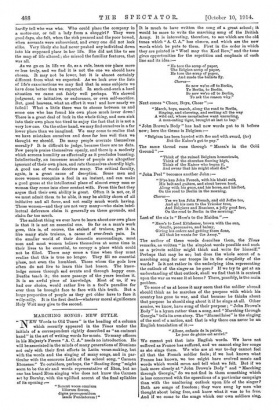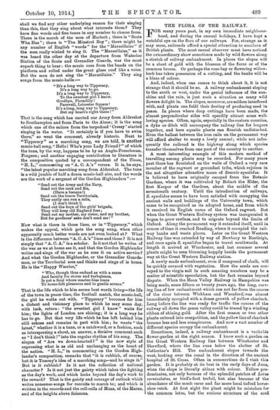MARCHING SONGS : NEW STYLE.
NEW Words to Old Tunes " is the heading of a column which recently appeared in the Times under the initials of a correspondent rightly described as "an eminent hand" in the art of writing words for music. To many officers in his Majesty's Forces " A. C. A." needs no introduction. He will be associated in the minds of many generations of Etonians not only with their first efforts in Latin verse-making, but with the words and the singing of many songs, and in par- ticular with the sonorous Latin of the school song, " Carmen Etonense." To outsiders, perhaps, the " Boating Song "might seem to be the air and words representative of Eton, but no one has beard Eton singing who does not know the Carmen
set by Banaby, with the uplifted accent of the final syllables of its opening " Sonent voces osmium
liliorum florem,
digna prosoquentium laude Fundatorem I"
It is much to have written the song of a great school; it would be more to write the marching song of the British Army. It is interesting, therefore, to see which are the old tunes which "A. C. A." has chosen, and which are the new words which he puts to them. First in the order in which they are printed is " Weel may the Keel Row," and the tune gives opportunities for the repetition and emphasis of each line and its idea :— " He tore the scrap of paper,
The Belgian scrap of paper,
He tore the scrap of paper, And made the bullets fly.
Chorus—
So now we're off to Berlin, To Berlin, to Berlin.
So now we're off to Berlin,
To ask the reason why."
Next comes " Cheer, Boys, Cheer ":— " March, boys, march, along the road to Berlin,
Singing, and cheering, and seeking all the way A wild cat, whose moustaches want uncurling,
A man-eating tiger, brought at last to bay."
"John Brown's Body " has had new words put to it before now; here the theme is Belgium :— "Belgium has been harried with fire and with sword, (ter)
But the Kaiser's got to pay."
The same thread runs through " Massa's in the Cold G round "
.- "Think of the ruined Belgium homesteads,
Think of the churches flaming high, Think of the Kaiser who began it, And swear that his might shall die."
" John Peel" becomes another John :— "D'ye ken John French, with his khaki suit,
His belt and gaiters, and stout brown boot,
Along with his guns, and his horse, and his foot, On the road to Berlin in the morning.
Chorus—
Yes we ken John French, and old Soffre too, And all his men to the Tricolor true, And Belgians and Russians, a jolly good few,
On the road to Berlin in the morning."
Last of the six is " Here's to the Maiden ":—
"Here's to Lord Kitchener, brown with the sun, Gentle, persuasive, and balmy,
Giving his orders and getting them done, All that ho wants for the Army."
The author of these words describes them, the Times remarks, as written " in the simplest words possible and such as a private soldier might think and write for himself." Perhaps that may be so; but does the whole secret of a. marching song for our troops lie in the simplicity of the words P Is it not rather in the underlying idea representing the outlook of the singer as he goes ? If we try to get at an understanding of that outlook, shall we find that it is centred upon the war as we see it at home ? There, possibly, is the main problem.
To some of us at home it may seem that the soldier abroad should think as he marches of the purpose with which his country has gone to war, and that because he thinks about that purpose be should sing about it if he sings at all. Other armies, we know, have sung of their purpose ; " John Brown's Body" is a hymn rather than a song, and "Marching through Georgia" tells its own story. The "Marseillaise" is the singing of the soul of a nation, and that is why there can never be an English translation of it :— " Aliens, enfants de la patrie, Le jour de gloire est arrive."
We cannot put that into English words. We have not suffered as France has suffered, and we cannot sing her songs as she sings them. We who are at war to-day cannot feel all that the French soldier feels ; if we had known what France has known, we too might have evolved music and words which would mean and tell what we felt. But if we look more closely at " John Brown's Body " and " Marching through Georgia," do we not find in them something which is less concerned with the operations of a particular campaign than with the unaltering outlook upon life of the singer ? Both are songs of freedom ; they were sung by men who thought about being free, and know what it was to be free. And if we come to the songs which our own soldiers sing,
shall we find any other underlying reason for their singing than this, that they sing about what interests them? They have fine words and fine tunes in any number to choose from. There is the march of the men of Harlech ; there is " Scots Wha Hae "; there is "The Minstrel Boy " ; there might be any number of English " words " for the "Marseillaise" if the men really wished to sing it. The "Marseillaise," as it was heard the other day at the departure from Waterloo Station of the Scots and Grenadier Guards, was the most superb thing to hear : the music rose from the bands on the platform and rolled under the great glass roof like a voice. But the men do not sing the " Marseillaise." They sing songs from the music-halls :—
" It's a long way to Tipperary,
It's a long way to go.
It's a long way to Tipperary,
To the sweetest girl I know.
Goodbye, Piccadilly!
Farewell, Leicester Square !
It's a long, long way to Tipperary, But my heart's right there !"
That is the song which has carried our Army from Aldershot to Southampton and from Paris to the Aisne; it is the song which one of the sailors from the torpedoed Cressy' started singing in the water. "It certainly is if you have to swim there," so went the comment, already historic. Next to " Tipperary" as a marching song, we are told, is another music-hall song," Hello! Who's your Lady Friend?" of which the tune, by the way, happens to be by an Anglo-Frenchman, Fragson; and another engaging contribution to literature is the composition quoted by a correspondent of the Times, " H. L.," commenting on " A. C. A.'s " verses. It is, he says, " the latest popular marching song from Aldershot. The tune is a wild jumble of half a dozen music-hall airs, and the words are the work of a sergeant of the Gordon Highlanders" --
"Send out the Army and the Navy,
Send out the rank and file,
(Have a banana!) Send out the brave Territorials,
They easily can run a mile,
(I don't think !) Send out the boys of the girls' brigade, They will keep old England free; Send out my mother, my sister, and my brother, But for goodness' sake don't send me !"
Now what is there in those lines, or in "Tipperary," which makes the appeal, which gets the song sung, when other apparently much better words are not even looked at ? What is the difference between "A. C. A.'s" lines and these ? It is not simply that "A. C. A." is a scholar. Is it not that he writes of the war as we at home see it, and that the Gordon Highlander writes and sings of the war as he sees it on active service ? And what the Gordon Highlander, or the Grenadier Guards- man, or the Territorial sees and thinks and sings of is home. He is the "Happy Warrior,"
" Who, though thus endued as with a sense
And faculty for storm and turbulence, Is yet a Soul whose master-bias leans To home-felt pleasures and to gentle scenes."
That is the life which to him seems best worth living—the life of the town in peace time, the football match, the music-hall, the girl he walks out with. "Tipperary" becomes for him a distant and visionary place to which he may some day, with luck, return : " the sweetest girl I know " waits for him; the lights of London are shining ; it is a long way he has to go. But that very life which he has left behind him still echoes and remains in part with him ; he wants " the latest," whether it is a tune, or a catchword, or a fashion, such as interspersing a shout, an answer, a derisive comment such as "I don't think !" into the regular rhythm of his song. The slogan of " Are we down-hearted ? " is the new style of expressing what is as old and unchanging as the heart of the nation. " H. L.," in commenting on the Gordon High. lander's composition, remarks that "it is rubbish, of course, but it is Tommy's idea of a marching song—and he sings it." But is it rubbish? Is it not the reflection of national character ? Is it not just the gaiety which takes the fighting as the day's work, and which looks beyond the day's work to the reward? That is the gaiety and courage of outlook which writes nonsense-songs for recruits to march to; and which is written in the records and the roll-calls of Mons, of the Marne, and of the heights above Soissona.



































 Previous page
Previous page